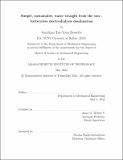| dc.contributor.advisor | Winter V, Amos G. | |
| dc.contributor.author | Bessette, Jonathan Tae-Yoon | |
| dc.date.accessioned | 2022-11-30T19:42:18Z | |
| dc.date.available | 2022-11-30T19:42:18Z | |
| dc.date.issued | 2022-05 | |
| dc.date.submitted | 2022-06-23T14:09:50.116Z | |
| dc.identifier.uri | https://hdl.handle.net/1721.1/146702 | |
| dc.description.abstract | There is a need for reliable, low maintenance off-grid desalination for drinking water in resource-constrained regions. However, current off-grid desalination systems rely on large solar arrays and battery capacity for sufficient power and energy storage - such systems greatly increase the capital costs, operating costs, complexity and maintenance. Electrodialysis is a flexible technology with significant energy and water efficiency in comparison to other thermal and membrane processes and thus provides significant reduction in solar array capacity; however, it has not been exhibited off-grid without significant energy storage. This work proposes and validates a simple, robust, and maximal water production rate control scheme which enables batteryless off-grid desalination. The control scheme proposed involves cascade control with an outer PID loop tracking power and commanding flow rate, and a coupled inner model based control loop which always produces the maximum allowable current and thus, maximum desalination rate for the real-time power. This control scheme is applicable and adaptable to any continuous power system but can be most advantageous in direct-drive variable power situations, such as with solar panels. The controller is extremely simple, computationally efficient, and robust to implement: it relies on two sensors - a flow meter and a conductivity meter, one equation, and a PID controller. We demonstrate and conduct initial validation of this capability in a field pilot using direct-drive photovoltaic batch electrodialysis. We demonstrate a battery reduction of 99.4% from comparable prior art (20 kwh to 120 wh) on a 2 kwh system at a control speed of 100 milliseconds and utilization of 79% and 91% of total solar energy on two separate days of testing. This control scheme enables significant reduction and even elimination of batteries and is a step towards minimal-maintenance, high production off-grid desalination. | |
| dc.publisher | Massachusetts Institute of Technology | |
| dc.rights | In Copyright - Educational Use Permitted | |
| dc.rights | Copyright MIT | |
| dc.rights.uri | http://rightsstatements.org/page/InC-EDU/1.0/ | |
| dc.title | Simple, sustainable, water straight from the sun - batteryless electrodialysis desalination | |
| dc.type | Thesis | |
| dc.description.degree | S.M. | |
| dc.contributor.department | Massachusetts Institute of Technology. Department of Mechanical Engineering | |
| dc.identifier.orcid | https://orcid.org/0000-0002-8261-1993 | |
| mit.thesis.degree | Master | |
| thesis.degree.name | Master of Science in Mechanical Engineering | |
